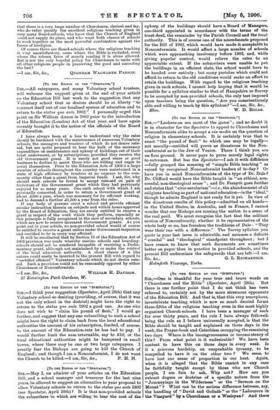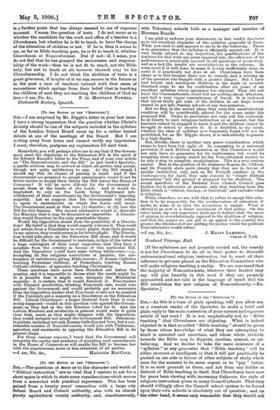LTO THE EDITOR OF THE "SPECTATOR."] SIR, — One is thankful for
your true and brave words on "Churchmen and the Bible" (Spectator, April 28th). But there is one further point that I do not think has been referred to, certainly not by the more strenuous opponents of the Education Bill. And that is, that this very amorphous, invertebrate teaching which is now so much decried forms three-fifths of the religious teaching even in the most highly organised Church schools. I have been a manager of such for over thirty years, and the rule I have always followed, being the rule as I believe universally accepted, is that the Bible should be taught and explained on three days in the week, the Prayer-book and Catechism occupying the remaining two days. Where is the incongruousness or inconsistency of this ? From what point is it undesirable ? We have been content to have this on three days in every week. Is it a grievous hardship, an unspeakable tyranny, to be compelled to have it on the other two ? We seem to have lost our sense of proportion in our heat. Again, when it is alleged that the Bible cannot in any case be faithfully taught except by those who are Church people, I am fain to ask, Why not P How can you extract dogma or doctrine of a specific nature from the " Journeyings in the Wilderness" or the "Sermon on the Mount" P What can be the serious difference between, say, the handling of "David and Goliath" or the "Labourers in the Vineyard" by a Churchman or a Wesleyan? And there is a further point that has always seemed to me of supreme moment. I mean the question of tests. I do not mean as to whether the candidate for the work and office of a teacher is a Churchman, but whether he is fit to teach, to have the charge of the education of children or not. If he is, then it seems to me, as far as Bible teaching goes, he is fit to teach it, whether Churchman or Nonconformist. But if not—if, I mean, you do not feel that he has grasped the seriousness and responsi- bility of the work—then he is not fit to teach, not the Bible only-, but not to teach at all, however staunch may be his Churchmanship. I do not think the abolition of tests is a great grievance, if in spite of it we can ensure in the future as in the past a race of teachers imbued with that sense of earnestness which springs from their belief that in teaching the children of men they are teaching the children of God no
less.—I am, Sir, &c., F. G. MONTAGU POWELL. ehelsworth Rectory, Ipswich.









































 Previous page
Previous page